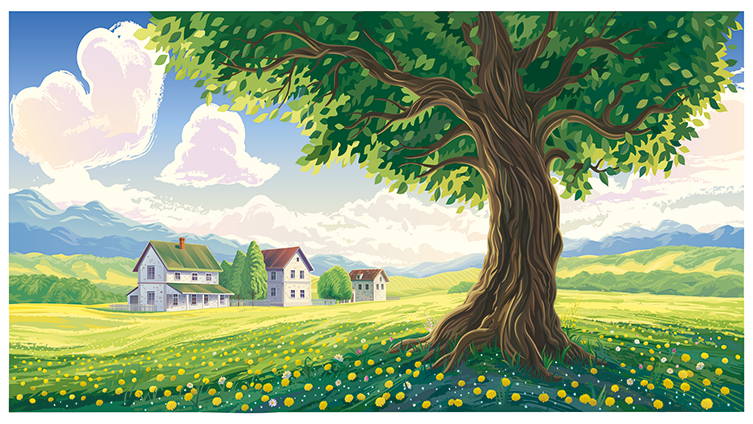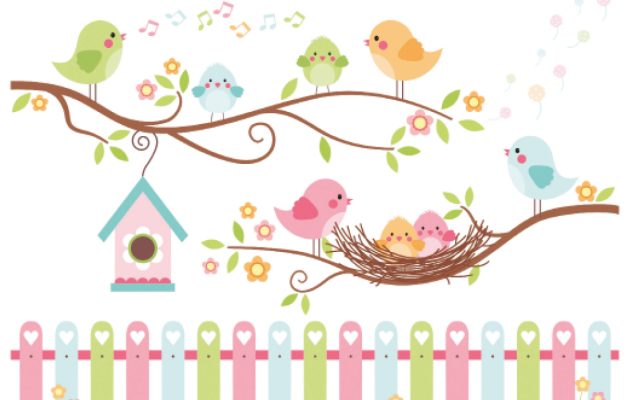Under Two Shires Oak – Episode 28

Under Two Shires Oak
« Previous Post- 1. Under Two Shires Oak – Episode 01
- 1. Under Two Shires Oak – Episode 28
ENTERING the large lounge of her parents’ farmhouse-turned-guesthouse in southern France, Suzanne smiled at the woman who stood there looking lost. She was about the same age as her mother, Grace.
“Bonjour.”
“Oh, hello. I mean, bonjour.”
“Have you just arrived?” Suzanne continued.
The woman sighed.
“You speak English? Good! Yes, today. My name’s Polly. I needed a holiday but I’m not a lazing-about person, so someone suggested this. Lovely scenery, good food and accommodation, and painting lessons to keep me busy.”
“My mother, Grace, does the food and Phil, my dad, the art classes. The scenery just comes with this part of rural France.”
“Did your dad do that?” Polly pointed to the painting that had pride of place on the walls of the room.
“The oak tree? Yes. Mum used to meet two friends beside it when she was a child. It was on the border of Nottinghamshire and Derbyshire – Two Shires Oak, the tree’s called. It became very important to all of them. Mum has some leaves from it in a little frame, and Dad did that painting for her before they moved here. I think it’s one of his best.” She broke off at the sound of footsteps approaching from the garden. “Here he is now.”
The three of them chatted a while, then Phil took their guest to the outhouses he’d converted into a studio. Watching Polly looking about her admiringly as she followed him, Suzanne thought how lucky she was to be living somewhere like this. And yet, increasingly, she was thinking of leaving. Of moving away . . . for a while. Her life was idyllic, but lately she’d been feeling that she’d like to do something more – she didn’t know quite what.
“You look solemn,” a voice said behind her in good English but with a definite French accent.
“Oh, hi, Yves.”
She smiled at the good-looking young man who’d come into the room. He was of a local family and helped her mum in the garden where she grew most of their vegetables. An added perk for him was that it gave him a chance to improve his English, which he was keen to do.
“Not solemn, exactly,” Suzanne continued. “Thoughtful.”
“Isn’t solemn thoughtful?”
“Yes, but you can be thoughtful without being solemn.”
“What were you thoughtful about?”
Suzanne tried to explain.
“I like helping my mum with the guests, and I enjoy the handicrafts class I take at the hospital,” she concluded, “but sometimes I feel I’d like to see somewhere else.” She looked again at the picture that Polly had admired. “Maybe there, where my parents are from. Mum has told me a lot about it.”
“Me, too,” Yves interrupted. “She tells me about it when we work.”
“Really?” Suzanne wondered if her mum missed her homeland more than she ever admitted.
“I hope you don’t go away,” Yves said, with his dazzling smile. “You fit here. You are the colours of the earth.”
Cycling to the hospital later Suzanne thought again about what Yves had said. The colours of the earth. Her mum had told her that was what her dad had said when he first did a portrait of her mum – that he’d need to use earth-colour paints. Suzanne had inherited her mother’s reddish-brown hair and hazel eyes. Though in no way stunning, she was pleased enough with her appearance. Certainly Yves liked her, she was sure about that! She liked him, too, as did her parents and younger brother, Peter.
Suddenly she had a vision of a future with Yves. Living in this beautiful location, both of them maybe running the business when her parents retired, with her brother, too, of course.
But by the time she was cycling home again just a few hours later, Suzanne was once again feeling that she wanted to do something else before settling down.
* * * *
“Where have I been recently? I worked with refugees fleeing the fighting in East Pakistan last year,” Polly said. “Biafra, too, I was involved there.”
Of an evening Suzanne often sat out on the terrace of the old farmhouse with whichever guests were there, maybe having a glass of the local wine with them, or just enjoying the warm, fragrant night and the conversation. She’d met some interesting people, but none more so than Polly. The older woman worked for an overseas aid agency and Suzanne found her stories fascinating. She could happily listen to her for hours.
But Polly encouraged her to talk, too.
“You say you take a handicrafts class at the hospital?”
“Yes. It’s to get people doing things again. A kind of therapy.”
“Art as therapy.” Polly nodded. “I’ve seen similar programmes on a bigger scale, helping victims of natural disasters or civil war cope with their trauma. It can be very effective. Keep up the good work.”
Suzanne was pleased that Polly seemed to think what she was doing was important. It buoyed her up for the next fortnight. But when Polly left, the feeling returned to Suzanne that her life was just too . . . easy.













